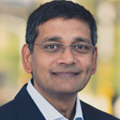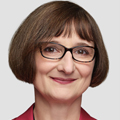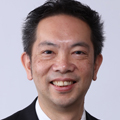Plenary Speaker
MNC 2023 Plenary Speakers List |
|
Dr. Sri Samavedam, imec, Belgium  PAPER TITLE Technologies that will propel compute systems scaling in the next decade |
|
| SHORT BIOGRAPHY Sri Samavedam is SVP of CMOS Technologies at imec, leading research programs in Logic, Memory, Photonics, 3D System Integration and Sustainabililty. Prior to that, he was Senior Director of Technology Development at Globalfoundries in Malta, NY, where he led qualification of 14nm FinFET technology and derivatives into volume production and development of 7nm CMOS technology. He began his career at Motorola in Austin, TX. He has over 100 publications, over 50 US patents and is a Senior Member of IEEE. He has a Ph.D. in Materials Science and Engineering from MIT and a Masters from Purdue University. SHORT ABSTRACT Compute system performance relies on innovations beyond pure technology scaling. Transistor density in chips continues to follow Moore’s law leveraging heterogenous integration, but the node to node performance improvements have slowed down. Memory and power walls limit compute system performance. Future compute systems will increasingly rely on new device architectures and system technology co-optimization to realize benefits beyond density scaling of compute, connect and store technologies. This talk will highlight technology innovations in logic, memory and 3D integration that will enable continued compute systems scaling. With increasing carbon footprint of semiconductor flows and the anticipated industry growth, we need urgent collective action to improve sustainability of semiconductor manufacturing. |
|
Dr. Heike Riel, IBM Research Europe, Switzerland  PAPER TITLE Quantum Computing Roadmap – Path to Quantum Advantage |
|
| SHORT BIOGRAPHY Dr. Heike Riel is IBM Fellow, Head of Science of Quantum & InformationTechnologies and Lead of IBM Research Quantum EMEA. She leads the Science of Quantum & InformationTechnologies department aiming to create scientific and technological breakthroughs in Quantum Computing and Technologies, hardware for Artificial Intelligence, Nanoscience and Nanotechnology and to explore new directions to computing. She received the master’s in physics from the Friedrich-Alexander University of Erlangen-Nürnberg and the PhD in physics from University of Bayreuth and an MBA from Henley Business College. She has authored more than 155 peer-reviewed publications and filed more than 50 patents. She has received several prestigious honors, e.g., elected member of the Leopoldina – German National Academy of Sciences and the Swiss Academy of Engineering Sciences; she was awarded the APS David Adler Lectureship Award in the Field of Materials Physics, the Applied Physics Award of the Swiss Physical Society, and the 2022 IEEE Andrew S. Grove Award. She was honored as Fellow of the American Physical Society, and with an honorary doctorate by Lund University. In 2022 she was elected to the National Academy of Engineering. SHORT ABSTRACT Quantum Computers open a new trajectory to evolve computation and enable solving difficult and complex problems that are intractable by classical computers. In the past years significant progress has been made toward understanding the scope of quantum computing, pushing its hardware and software technology, developing applications, and advancing error mitigation/correction protocols. An entire new computing system is built from the bottom up and is moving from research labs to data centers and an unprecedented access via the cloud is provided. In this presentation I will give an overview about the recent progress of our quantum systems based on superconducting quantum processors describing the tremendous improvements achieved in scale, quality and speed in recent years and describe how modularity will enable scaling, and how quantum communication will increase computational capacity. The discussion of our Quantum Development Roadmap will illustrate the path to continuously increasing performance, capabilities, and value and achieve quantum advantage. |
|
Dr. Yasumitsu Orii, Rapidus Corporation, Japan  PAPER TITLE Challenges and Opportunities of Semiconductor Packaging in the Chiplet Era |
|
| SHORT BIOGRAPHY Dr. Yasumitsu Orii joined IBM Japan in 1986 and was a leading expert on Flip Chip organic packages, which had contributed to the performance improvements and miniaturization of such products as servers, laptop computers, and HDDs. The packaging technology is becoming more important for next generation server products as Moore’s Law reaches its limits. His flip chip expertise extended into many related areas. Initially, he was a pioneer of flip chip on FPC (Flexible Printed Circuit) for HDDs, which allowed the read/write amplifier ICs to be mounted on the suspension and much closer to the GMR head. Later, he developed the C2 (Chip Connection) technology that supported low-cost 50-μm-pitch flip chip bonding for the commodity consumer electronics market and it was licensed to a company in Taiwan. At IBM Research Tokyo, he was leading the next generation flip chip organic package, 3D-IC projects and Neuromorphic Computing for IBM Servers and creating new technologies under a Joint Development Program involving many leading Japanese materials companies. He left IBM in 2014 and joined NAGASE & CO., LTD. He established “New Value Creation Office” under the direct control of the president and launched the material informatics software as a service in 2020. He left NAGASE and he joined Rapidus Corporation in 2022/Dec. Now he is the senior managing executive officer to lead the 3D Assembly Division. SHORT ABSTRACT The advancements in semiconductor manufacturing and packaging technologies are revolutionizing the semiconductor industry. Splitting a SoC chip into individual chips by function brings improved yields, shorter design, development cycles, and cost reduction. However, packaging structures are becoming more complex, leading to increased design complexity. To overcome these challenges, the entire industry should promote the integration of front-end and then back-end processes and establish a chiplet ecosystem. |
